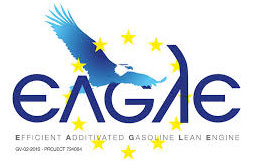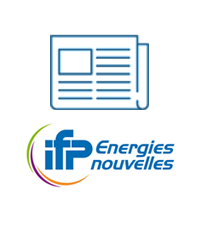23.10.2018
5 minutes of reading

The EAGLE project is being conducted by the European industry partners Renault, IFPEN that coordinate the project, Continental, FEV and Saint-Gobain together with the technical universities of Naples, Aachen and Valencia.
An innovative gasoline engine concept is being developed to reach a peak efficiency of 50% by incorporating advanced technologies: a new breakthrough ignition system and hydrogen addition to support ultra-lean combustion, as well as smart insulation coatings to reduce the heat losses, and new materials for after-treatment devices.
The project is progressing according to expectations thanks to an efficient collaboration between the various partners and significant team work.

The industrial partners Renault, IFPEN (IFP Energies nouvelles), Continental, FEV Europe GmbH, and SAINT-GOBAIN RESEARCH PROVENCE together with the Universita degli Studi di Napoli Federico II (UNINA), the Institute for Combustion Engines of Technical University RWTH Aachen and the Research Institute CMT of Universitat Politècnica de València are currently developing a new highly efficient combustion system within the EU-funded project EAGLE (Efficient Additivated Gasoline Lean Engine). The European researchers are working to obtain a gasoline engine at least 20% more efficient than current engines, main objective of this project led by the French research organization IFPEN, who coordinates the participation of eight partners from Germany, France, Italy and Spain.
The project evaluates different advanced technologies to achieve its aim of developing an innovative engine able to increase its maximal efficiency from the current maximum of 40% to 50%, and to achieve the vehicle CO2 emissions target of 50 g/km.
The potential of three different technologies are being explored: thermal insulation in different parts of the engine to reduce heat losses, hydrogen boosting and development of an ultra-lean high-efficiency ignition system to improve lean combustion, and the use of new materials for deNOx after-treatment devices.
First, based on a study performed by Renault, the architecture of the hybrid vehicle and the real driving cycles to be used for the EAGLE project were defined. Then UNINA developed a model adapted for hybrid architectures to simulate the most critical real driving conditions in terms of CO2 emissions and concluded that a plug-in HEV coupled with a highly efficient internal combustion engine would be able to reach the EAGLE prescribed CO2 objective.
By applying smart insulation coatings in several parts of an engine, it may be possible to reduce the temperature difference between the gas inside the combustion chamber and the engine walls during the full engine cycle, and heat losses may be thus minimized. At CMT-Universitat Politècnica de València, parametric studies have been performed to define the main characteristics of the smart coating needed, and evaluate the possible gain in heat losses. These results are used by Saint-Gobain to develop new coatings with improved material and structure based on plasma spray technique. The relevance and effectiveness of the smart coatings are being evaluated at IFPEN on a research engine using recent techniques to measure the combustion chamber surface temperature.
Modern gasoline engines function with lean combustion in order to reduce CO2 emissions. However, increasing the amount of air requires some boosting and an enhancement of the mixture reactivity to avoid misfire. This has led IFPEN to study the effect of mixing small quantities of hydrogen into the intake air and to perform experimental measurements on a single-cylinder research engine to determine the efficiency and the emissions. An additional challenge considered in EAGLE by Renault is how to produce the hydrogen on-board. Lean conditions also require a novel ignition and combustion system. Preliminary studies by the VKA institute of the RWTH Aachen University and FEV provided the design of a small pre-chamber integrated in the cylinder head where a small amount of air-fuel mixture is ignited and the turbulent flame jets injected into the main chamber through small holes. The pre-chamber prototypes for the experimental investigations have been built by FEV and successfully tested on VKA’s single cylinder engine. The required injection systems for both the pre-chamber and main chamber have been designed and built by Continental.
Considering the new challenges of such a combustion system RWTH Aachen is developing an innovative NOx storage catalyst, starting with the experimental investigation of various support materials. The idea is to maximize NOx reduction performance in regeneration phases and also to lower the oxygen storage capacity, thus decreasing additional CO2 production. A demonstrator unit will then be prepared and tested in 2019 with the final multi-cylinder engine demonstrator of Renault. In addition to this, alternative solutions are also currently studied at IFPEN in order to assess the potential of H2-SCR for low temperature deNOx enhancement.
The EAGLE project has successfully passed the mid-term review and the technologies developed by the partners up to now are being integrated in a single-cylinder research engine manufactured by Renault and tested at IFPEN, with the aim of quantifying the expected improvements in terms of efficiency and pollutant emissions. In parallel, the design of the multi-cylinder Renault engine demonstrator also started in 2018.
This project has received funding from the European Union's Horizon 2020 research and innovation program under grant agreement No 724084.






